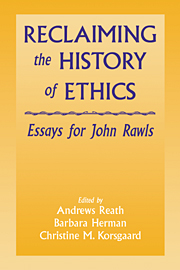Book contents
- Frontmatter
- Contents
- List of Contributors
- Introduction
- Aristotle on the Soul's Conflicts: Toward an Understanding of Virtue Ethics
- Coercion, Ideology, and Education in Hobbes's Leviathan
- The Hobbesian Side of Hume
- The Natural Goodness of Humanity
- Metaphysics, Philosophy: Rousseau on the Problem of Evil
- Within the Limits of Reason
- A Cosmopolitan Kingdom of Ends
- Legislating for a Realm of Ends: The Social Dimension of Autonomy
- Kant on the Objectivity of the Moral Law
- Kantian Virtue: Priggish or Passional?
- Taking the Law into Our Own Hands: Kant on the Right to Revolution
- Kant on Aesthetic and Biological Purposiveness
- Kant on Ends and the Meaning of Life
- Community and Completion
Kant on Ends and the Meaning of Life
Published online by Cambridge University Press: 04 November 2009
- Frontmatter
- Contents
- List of Contributors
- Introduction
- Aristotle on the Soul's Conflicts: Toward an Understanding of Virtue Ethics
- Coercion, Ideology, and Education in Hobbes's Leviathan
- The Hobbesian Side of Hume
- The Natural Goodness of Humanity
- Metaphysics, Philosophy: Rousseau on the Problem of Evil
- Within the Limits of Reason
- A Cosmopolitan Kingdom of Ends
- Legislating for a Realm of Ends: The Social Dimension of Autonomy
- Kant on the Objectivity of the Moral Law
- Kantian Virtue: Priggish or Passional?
- Taking the Law into Our Own Hands: Kant on the Right to Revolution
- Kant on Aesthetic and Biological Purposiveness
- Kant on Ends and the Meaning of Life
- Community and Completion
Summary
Around 1790, Kant thought intensively and movingly about the point of the universe and our role within it. In this essay I try to bring these reflections to life by unifying and expanding them into a plausible account. This involves an exploration of Kant's diverse uses of the word “end” – as in “end in itself” and “final end.”
Two Senses of Zweck
In the Metaphysics of Morals, Kant defines end (Zweck) as “an object of Willkür [of a rational being] through the representation of which it is determined to an action of producing this object” (MdS 6:381). According to this definition, which fits most occurrences of the word throughout Kant's writings, ends are what we more commonly call aims or goals: namely states of affairs or events that one has in mind while acting and tries to attain through one's conduct.
In light of many other passages, it is appropriate to construe this definition broadly, by including goals that have one or more of the following four features: (1) graduated goals: whose attainment is a matter of degree (to become a top pianist); (2) open-ended goals: whose attainment is capable of indefinite augmentation (to become strong, wealthy, happy, secure); (3) conservative goals: to extend into the future a state of affairs that already obtains (to keep my weight below 140lbs); and (4) holistic goals: to attain an overall pattern that includes elements of the past or present (that the Nazi crimes be punished).
- Type
- Chapter
- Information
- Reclaiming the History of EthicsEssays for John Rawls, pp. 361 - 387Publisher: Cambridge University PressPrint publication year: 1997
- 8
- Cited by



